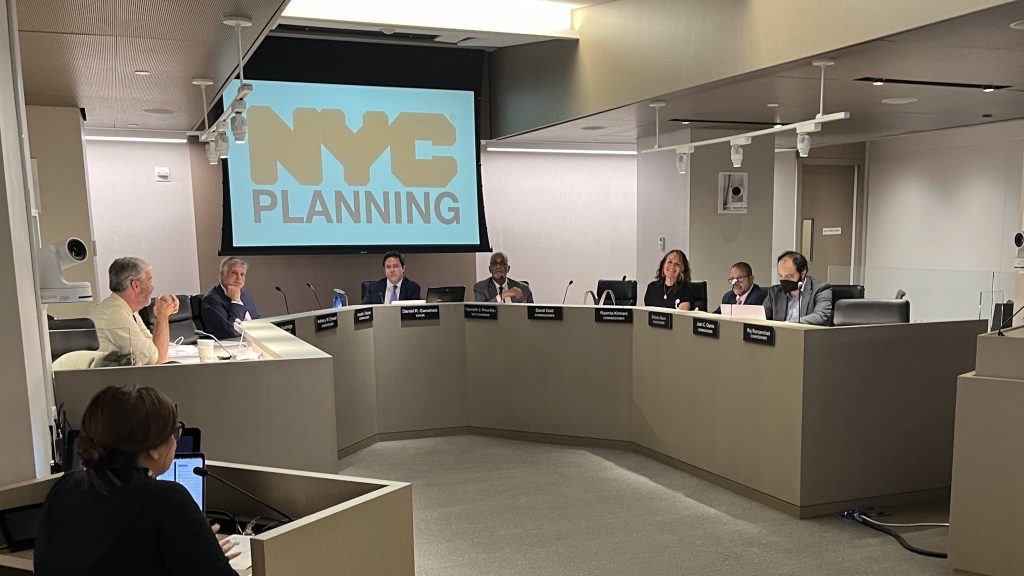12 Hours of Testimony at City of Yes Hearing

Courtesy of @NYCPlanning
By Jean Brannum and Celia Bernhardt | news@queensledger.com
The City of Yes for Housing Opportunity got a marathon of a public hearing on July 10, with residents and representatives testifying to the City Planning Commission for over 12 hours.
The third section of the Adams administration’s three-part City of Yes plan (with other proposals addressing climate and commercial businesses), City of Yes for Housing Opportunity includes a broad set of zoning and policy changes that would allow “a little more housing in every neighborhood.”
Last week’s meeting was part of a larger public review phase for the housing proposal, where borough presidents and community boards can weigh in and suggest alterations. The next step after public review concludes is a binding vote from the City Planning Commission; following that, the City Council can vote to either approve, modify, or deny the plan. That final vote is expected to take place before the end of 2024.
Many residents of Queens and Brooklyn expressed concerns about suburban neighborhoods losing their quiet environment. Some residents are worried that the population increase will exacerbate existing issues in the neighborhood.
“Let us be clear about what this housing proposal does in fact represent: A little more Manhattan in every neighborhood,” said John Sheridan, a City Island resident who also said the changes would cause neighborhoods to lose their unique characteristics.
On the flip side, many in the meeting argued that the changes are needed to create more affordable housing options. Vice President of Policy at TechNYC and former City Council member Marjorie Velasquez explained how the lack of affordable housing keeps potential talent out of the technology industries.
“Young professionals, even those with promising careers, are priced out of the market, forcing them to relocate or furlough living in New York City,” Velasquez said. “We want people building technology in New York City and build their families here.”
One of the most outspoken critics of the City of Yes was Councilmember Vicky Paladino, whose district includes College Point, Douglaston, and North Flushing. She said the city has pushed the proposed zoning changes “like a freight train” and said it would be better to have a pilot program for the changes.
Paladino compared the process of the City of Yes to the legalization of cannabis, saying that the quick legalization process led to multiple smoke shops popping up around the city.
Department of City Planning Director Daniel Garodnick argued with Paladino saying that 50% of the people in her district are rent-burdened, which means people pay more than 30% of their income towards housing. Paladino replied that her district is affordable due to Co-op apartments and condos.
A map of community districts shows some neighborhoods in Paladino’s district built between 2,000 and 4,000 new buildings between 2010 and 2023. A section including the Douglaston area shows between zero and 2,000 new buildings.
Carol Mccarthy from the Douglaston Civic Association said that only developers would benefit from the proposal and that no affordable housing would be built. Mccarthy also said that if the City of Yes passes, then Douglaston would consider seceding from New York City.
“If passed we will be forced to consider the real possibility of secession from the city of New York,” Mccarthy said. “This can be done and it will be done if necessary. We have the means to do it”
Another disagreement ensued between Paul Graziano — an urban planner at the forefront of advocacy against the housing proposal — and the City Planning director. Graziano argued that increasing housing density would be “apocalyptic” due to the increase in number of people living in areas built for single-family homes. He also said that the population of New York City has not changed since 1960. According to city data and census data, the population of the city has increased since 1960 by about 1 million.
Graziano’s other point was that the city already allows for more housing to be built, so there is no need to loosen restrictions more. Graziano claims the current zoning laws allow housing for up to 20 million people to be built now.
“I am tired of listening to the propaganda from the City Planning Commission and Department of City Planning,” Graziano said. “You’ve heard the voices of the folks from outside of Manhattan, from the community boards, as well as the civic organizations. And if you persist in going forward with this, there will be consequences to this and we’ll find out what they are.”
Garodnick said that this has been brought up at other community board meetings and said it indicated a “fundamental misunderstanding of how zoning works.”
According to Garodnick, land zones are rarely completely utilized due to existing buildings and finances among other reasons. He also said that the proposal would not eliminate single-family homes. Gardonkick used his response to also say that people should stick to the facts during the hearing. One person from the crowd told the committee to “stop lying” though it is not clear what they were referring to.
The Department of City Planning will vote on the proposed changes in September. In the meantime, New Yorkers can make public statements at the next public hearing on July 24.

















































